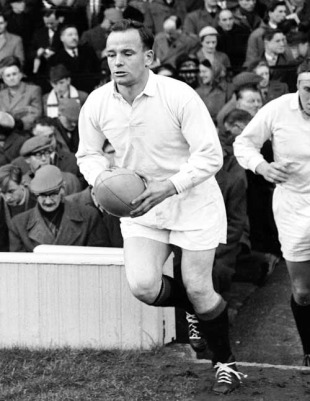|
1960
A war of attrition
Huw Richards
March 19, 2010

Scrum-half Dickie Jeeps was captain of the England side that drew with France in 1960
© Getty Images
Enlarge
England's draw with Scotland at Murrayfield on Saturday is already mercifully receding from the memory, but it did represent one landmark - it was England's first draw in 143 matches spread over 12 years since the 26-26 collision with the All Blacks, a match so different that it is hard to believe they were playing the same sport, at Twickenham in December 1997. That's some run of clearcut results, particularly when you remember that historically England are far likelier to play drawn matches than any other country. In the last 100 years they have drawn 36 of their 523 matches - around seven per cent. No other country reaches even five per cent, while the All Blacks and Wallabies draw barely three per cent of theirs. England's three dozen stalemates include a hat-trick of draws with France between 1959 and 1961 - no mean achievement given that this was the Tricolores first period of dominance in the European game, taking their first outright title in 1959 and following up in 1961 and 1962. A simple look at the scores will tell you why drawn matches were much more frequent in those days - the two teams accumulated a total of 22 points between them across 240 minutes of rugby. Most momentous of them was the one in the middle, played at the Stade Colombes on February 27, 1960. Each team was unbeaten - France had so far played only Scotland, opening their title defence with a 13-11 win at Murrayfield, while England had defeated Wales 14-6 in a match remembered for the spectacular debut by Richard Sharp, a late call-up at outside-half when Bev Risman was injured, and followed by beating Ireland 8-5. As a spectacle it was little more memorable than Murrayfield last Saturday, a war of attrition between two fine sets of forwards described by one account as 'an orgy of'scrums and line-outs'. There was also a memorable battle between two fine scrum-halves, France's Pierre Danos and the England captain Dickie Jeeps, but in conditions made for the rugged Englishman. Dropped by England the year before, Jeeps had played his way back into contention and ultimately captaincy by his performances on the Lions tour of New Zealand and the England trials - getting the nod as leader in spite of being rebuked by the chairman of selectors by getting his Probables team together for a practice in advance of the Final Trial, a practice seen as smacking of professionalism. Danos had been a key figure in the rise of the French, scoring a try in their first victory in Cardiff in 1958 and the drop goal that secured a draw in the first test of their victorious trip to South Africa later the same year. Here, though, he was stifled by Jeeps' defensive aggression, the England captain hunting him down so persistently that French writer Antoine Blondin said they looked like 'a snail and his shell'.
France took the lead after 20 minutes when the stylish fullback Michel Vannier landed a penalty goal. England's equalising score was a triumph for both forwards and backs. Veteran hooker Stan Hodgson, a 31-year-old from Durham playing his first season of international rugby took a strike against the head. Jeeps sent Sharp away on a characteristic break and centre Mike Weston scored near the post. It should have been a simple conversion for England fullback Don Rutherford. He struck the post, an error that was still vividly remembered by Jeeps when interviewed nearly 50 years later. It should be noted of Rutherford, destined for a long career as heading of coaching development at Twickenham, that he missed little else this season - a total of five conversions and three penalties making him the leading scorer in the championship. Well, though, might Jeeps remember it. England went on to beat Scotland 21-12, a victory clinched by a spectacular early scoring burst that brought a drop goal and two converted tries inside 13 minutes. France made several changes for their next match, ending the international career of Danos, whose greatest personal triumph - the extraordinary narrow-angled drop-goal that brought Beziers their first ever French Championship in 1961 - was still however to come. The remodelled French team went on to win 16-8 in Cardiff then finish the season with a 23-11 victory over Ireland remembered for the unprecedented hat-trick of drop goals by outside-half Pierre Albaladejo. So England and France ended the season tied for the championship on seven points apiece, three victories each plus that draw. It was the only seven-point tie in tournament history, giving the draw a unique distinction. Numerous Five and Six Nations matches over the years have deprived one team of a Grand Slam. England hope to do it to France on Saturday, France did it to Ireland and England to France in 2007. France v England, fifty years ago at the Stade Colombes, is the only match that has thwarted two. © Scrum.com
| |||||||||||||||
Live Sports
Communication error please reload the page.
-
Football
-
Cricket
-
Rugby
-
- Days
- Hrs
- Mins
- Secs
F1 - Abu Dhabi GP
Abu Dhabi Grand Prix December 11-131. Max Verstappen ()
2. Valtteri Bottas (Mercedes)
3. Lewis Hamilton (Mercedes)
4. Alexander Albon ()
5. Lando Norris ()
6. Carlos Sainz Jr ()
-
ESPNOtherLive >>
Snooker - China Open
Tennis - Miami Open

